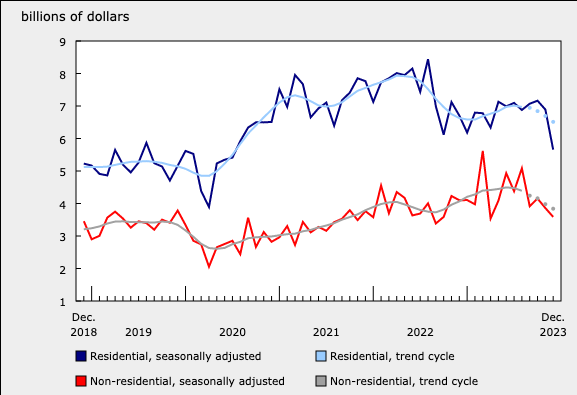
News
Business Intelligence
Dealer’s Corner
StatCan annual review of 2023 building permits: Inflation masking decline
February 8, 2024 By Statistics Canada

Year over year, the total current dollar value of building permits fell 3.2% to $132.2 billion in 2023. However, rising material and labour costs inflated nominal building permit valuations. On a constant dollar basis (2017=100), the total annual value of building permits decreased 8.9% from 2022 to $84.2 billion in 2023. The remainder of this article will be presented in constant dollars (2017=100) to focus on real permit value changes
over time.
The residential sector experienced its second consecutive annual decline in building permit values, declining by 15.5% to $48.3 billion in 2023, while the non-residential sector rose for the third consecutive year, up 1.7% to $35.9 billion in 2023. The institutional (+14.4%; +$1.4 billion) and industrial (+4.1%; +$290.8 million) components experienced series highs in construction intentions, leading to an overall growth increase in the non-residential sector. However, growth in the non-residential sector was tempered by the decline in the commercial component (-6.1%; -$1.1 billion), which accounted for almost half of the value of construction intentions in the non-residential sector.
The gains in the institutional component were mostly attributed to large construction intentions for hospitals and long-term care facilities. The demand on the Canadian healthcare system has been magnified in recent years due to the COVID-19 pandemic and Canada’s aging population. A variety of public policies have been announced to address the high demands on the healthcare system, including investments from various levels of government like the federal Canada Health Transfer top-ups, and bilateral agreements between governments. In 2023, the largest building permit issued was for a new hospital in Vaudreuil-Dorion (Quebec), with an estimated construction value of almost $1.0 billion. Construction intentions for hospital permits that cost over $100.0 million were recorded in Montréal and the Greater Toronto Area, as well as throughout British Columbia, specifically in Dawson Creek, North Cowichan, Williams Lake and the Greater Vancouver Area.
Building permits for long-term care facilities also bolstered growth in the institutional component, with large construction intentions concentrated in Ontario, Quebec and Nova Scotia. The institutional component in Nova Scotia (+197.0%; +$146.8 million) recorded its highest-ever yearly increase in 2023, with approximately three-quarters of institutional construction intentions tied to senior living spaces and specifically long-term care facilities, aligning with the Government of Nova Scotia’s goal of expanding the availability of long-term care in the province.
Print this page